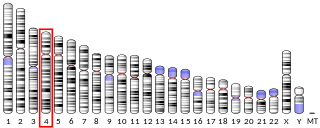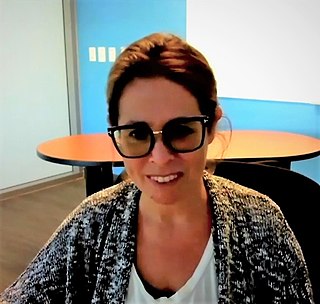
A Langerhans cell (LC) is a tissue-resident macrophage of the skin once thought to be a resident dendritic cell. These cells contain organelles called Birbeck granules. They are present in all layers of the epidermis and are most prominent in the stratum spinosum. They also occur in the papillary dermis, particularly around blood vessels, as well as in the mucosa of the mouth, foreskin, and vaginal epithelium. They can be found in other tissues, such as lymph nodes, particularly in association with the condition Langerhans cell histiocytosis (LCH).

FOXP3, also known as scurfin, is a protein involved in immune system responses. A member of the FOX protein family, FOXP3 appears to function as a master regulator of the regulatory pathway in the development and function of regulatory T cells. Regulatory T cells generally turn the immune response down. In cancer, an excess of regulatory T cell activity can prevent the immune system from destroying cancer cells. In autoimmune disease, a deficiency of regulatory T cell activity can allow other autoimmune cells to attack the body's own tissues.

Interleukin 21 (IL-21) is a protein that in humans is encoded by the IL21 gene.
Pyroptosis is a highly inflammatory form of lytic programmed cell death that occurs most frequently upon infection with intracellular pathogens and is likely to form part of the antimicrobial response. This process promotes the rapid clearance of various bacterial, viral, fungal and protozoan infections by removing intracellular replication niches and enhancing the host's defensive responses. Pyroptosis can take place in immune cells and is also reported to occur in keratinocytes and some epithelial cells.
CD70 is a protein that in humans is encoded by CD70 gene. CD70 is also known as a ligand for CD27.
Understanding of the antitumor immunity role of CD4+ T cells has grown substantially since the late 1990s. CD4+ T cells (mature T-helper cells) play an important role in modulating immune responses to pathogens and tumor cells, and are important in orchestrating overall immune responses.
CD4 immunoadhesin is a recombinant fusion protein consisting of a combination of CD4 and the fragment crystallizable region, similarly known as immunoglobulin. It belongs to the antibody (Ig) gene family. CD4 is a surface receptor for human immunodeficiency virus (HIV). The CD4 immunoadhesin molecular fusion allow the protein to possess key functions from each independent subunit. The CD4 specific properties include the gp120-binding and HIV-blocking capabilities. Properties specific to immunoglobulin are the long plasma half-life and Fc receptor binding. The properties of the protein means that it has potential to be used in AIDS therapy as of 2017. Specifically, CD4 immunoadhesin plays a role in antibody-dependent cell-mediated cytotoxicity (ADCC) towards HIV-infected cells. While natural anti-gp120 antibodies exhibit a response towards uninfected CD4-expressing cells that have a soluble gp120 bound to the CD4 on the cell surface, CD4 immunoadhesin, however, will not exhibit a response. One of the most relevant of these possibilities is its ability to cross the placenta.

Lymphocyte-activation gene 3, also known as LAG-3, is a protein which in humans is encoded by the LAG3 gene. LAG3, which was discovered in 1990 and was designated CD223 after the Seventh Human Leucocyte Differentiation Antigen Workshop in 2000, is a cell surface molecule with diverse biological effects on T cell function but overall has an immune inhibitory effect. It is an immune checkpoint receptor and as such is the target of various drug development programs by pharmaceutical companies seeking to develop new treatments for cancer and autoimmune disorders. In soluble form it is also being developed as a cancer drug in its own right.
Regulatory B cells (Bregs or Breg cells) represent a small population of B cells that participates in immunomodulation and in the suppression of immune responses. The population of Bregs can be further separated into different human or murine subsets such as B10 cells, marginal zone B cells, Br1 cells, GrB+B cells, CD9+ B cells, and even some plasmablasts or plasma cells. Bregs regulate the immune system by different mechanisms. One of the main mechanisms is the production of anti-inflammatory cytokines such as interleukin 10 (IL-10), IL-35, or transforming growth factor beta (TGF-β). Another known mechanism is the production of cytotoxic Granzyme B. Bregs also express various inhibitory surface markers such as programmed death-ligand 1 (PD-L1), CD39, CD73, and aryl hydrocarbon receptor. The regulatory effects of Bregs were described in various models of inflammation, autoimmune diseases, transplantation reactions, and in anti-tumor immunity.

Immune checkpoints are regulators of the immune system. These pathways are crucial for self-tolerance, which prevents the immune system from attacking cells indiscriminately. However, some cancers can protect themselves from attack by stimulating immune checkpoint targets.
T-cell receptor revision is a process in the peripheral immune system which is used by mature T cells to alter their original antigenic specificity based on rearranged T cell receptors (TCR). This process can lead either to continuous appearance of potentially self-reactive T cells in the body, not controlled by the central tolerance mechanism in the thymus or better eliminate such self-reactive T cells on the other hand and thus contributing to peripheral tolerance – the extent of each has not been completely understood yet. This process occurs during follicular helper T cell formation in lymph node germinal centers.
Daniel A. Portnoy is a microbiologist, the Edward E. Penhoet Distinguished Chair in Global Public Health and Infectious Diseases, and a professor of biochemistry, Biophysics and Structural Biology in the Department of Molecular and Cell Biology and in the Division of Microbiology in the Department of Plant and Microbial Biology at the University of California, Berkeley. He is one of the world's foremost experts on Listeria monocytogenes, the bacterium that causes the severe foodborne illness Listeriosis. He has made seminal contributions to multiple aspects of bacterial pathogenesis, cell biology, innate immunity, and cell mediated immunity using L. monocytogenes as a model system and has helped to push forward the use of attenuated L. monocytogenes as an immunotherapeutic tool in the treatment of cancer.

Franca Ronchese is an Italian-New Zealand immunologist. She currently leads the immune cell biology programme at the Malaghan Institute of Medical Research in Wellington, New Zealand and is a research professor at Victoria University of Wellington.
Jean Sylvia Marshall, born in Birmingham, England, is a Canadian immunologist and acting Professor and Head of the Department of Microbiology & Immunology at Dalhousie University in Halifax, Nova Scotia, Canada. Marshall's work has investigated how mast cells are involved in the early immune response to infection and antigen. She is best known for her discovery of the previously unknown degranulation-independent immunoregulatory roles of mast cells in infection and allergy and their ability to mobilize dendritic cells.
Tania H. Watts is a Canadian Immunologist, Professor at the University of Toronto, past President of the Canadian Society for Immunology and from 2009 to 2019 held the Sanofi Pasteur Chair in Human Immunology at the University of Toronto. Tania Watts holds a Tier 1 Canada Research Chair in Anti-viral Immunity and was named a Distinguished Fellow of the American Association of Immunologists, class of 2022.

Laura K. Mackay is an Australian immunologist and Professor of Immunology at the University of Melbourne. Mackay is the Theme Leader in Immunology and Laboratory Head at the Peter Doherty Institute for Infection and Immunity. In 2022, she was the youngest Fellow elected to the Australian Academy of Health and Medical Sciences.

Elina Zúñiga is an Argentinian Immunologist and Professor of Molecular Biology in the Division of Biological Sciences at the University of California, San Diego. Zúñiga has made critical discoveries regarding host-virus interactions in both acute and chronic infections. Using lymphocytic choriomeningitis models (LCMV) and murine cytomegalovirus models, her laboratory at UCSD studies host immune adaptations in chronic viral disease and methods of viral suppression of the immune system in order to develop novel methods and identify novel targets of anti-viral defence. In 2018, Zúñiga was chosen by the American Association of Immunologists to give the international Vanguard Lecture. Zúñiga is also co-founder of the Global Immunotalks series which she and Carla Rothlin started in 2020 as a means to make cutting-edge immunology research freely available and easily accessible to a global audience.

Dianne Sika-Paotonu is a New Zealand immunologist, biomedical scientist and academic in the Department of Pathology and Molecular Medicine and Associate Dean (Pacific) at the University of Otago Wellington. She is of Tongan descent and is the first Pasifika biomedical scientist to receive the Cranwell Medal for science communication in 2020 and the 2022 Prime Minister's Science Communicator of the Year prize.
Merilyn Hibma is a New Zealand viral immunologist, and is a full professor at the University of Otago, specialising in immune regulation by viruses, especially human papillomavirus, the causative agent of cervical cancer.
Gabriele Ursula Dachs is a New Zealand academic, and is a full professor at the University of Otago, specialising in the how cancer cells respond to hypoxia, and developing novel treatments for cancer.








